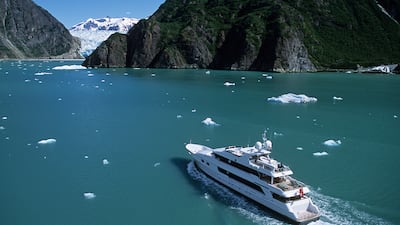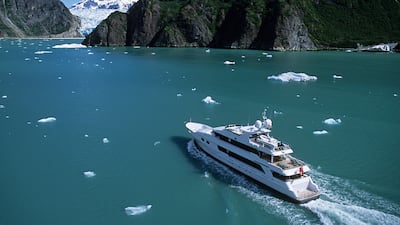You may have heard of a coelacanth. It is a prehistoric-looking, deep-water fish, rarely seen unless washed up dead on shore. Earlier this year, a scientific expedition off Indonesia dived to depths of 150 metres and beyond to study it in its natural habitat for the first time. What made this possible? The research was conducted from a private superyacht, hosted free of charge by its owner.
It’s one of more than 300 vessels – from tugs to catamarans, sailing boats to cruisers to billionaire-class megayachts – registered with the Florida-based International SeaKeepers Society. The group connects marine scientists with boat owners to carry out research that, even without declining grant funding, would often be impossible. This year alone, it has helped run more than 20 expeditions.
“The fact is that there is more research about the marine world to be done and so many scientists trying to do that, and yet the number of vessels available to them to do that pales in comparison,” says the society’s chief programmes officer Tony Gilbert. “Even if a university has a boat, it’s one that maybe five labs are fighting over.”

SeaKeepers’ solution is elegant: if a boat owner is heading somewhere relevant, persuade them to bring a scientist or six along. The gains for science are immense – not least the comfort of a 100-metre floating palace, even if the vessel’s size makes it less than nimble. Crucially, private yachts can access areas off-limits to official research ships – or at least without enduring months of red tape and permits from the governments that oversee those territorial waters.
That works both ways. Scientists’ research permits can grant boat owners rare access to tightly controlled waters, like the Galapagos Islands or the South Pacific’s Pitcairn Islands, visited recently by a SeaKeepers mission.
The owners’ commitment varies. Most contribute depth-sounding data to the Seabed 2030 initiative to map the ocean floor by the decade’s end. Some host only short daytrips; others volunteer for multi-week expeditions. Research may focus on photogenic subjects such as whales, dolphins, sharks, and coral reefs, but also less headline-grabbing projects: tracking pollution in bays or data-heavy studies “full of jargon that only the scientists involved seem to understand”, Gilbert laughs. Owners who charter their vessels may even take a financial hit to participate.

“Some owners may just think of their boat as a status symbol, and chances are they won’t be working with us,” Gilbert adds. “But others are aware that they have this vessel, crewed and ready to go – which is incredibly expensive to do – but which just sits there a lot of the time.
“These people typically love the ocean and understand the need to protect it. So getting involved with science is a recognition of the need to really utilise their vessel well. Besides which, boat-owners tend to talk to each other. And being able to say you’ve just helped advance science on your last trip tends to strike other owners as ‘wow, that’s really cool’”.
The concept is catching on. In the UK, Yachts for Science – backed by the Ocean Family Foundation – also matches boats with biologists. This year it’s sending researchers to French Polynesia to study manta rays and to Scotland’s Outer Hebrides to investigate the sea floor.
“Many missions are simple,” says project lead Rosie O’Donnell. “If you’re tagging sharks off Majorca, you just need a local sport fisherman’s boat. We’re not usually asking for something with its own submersible.” She currently oversees 20 projects and is looking for a major investor to help reach more boat owners.
“But there’s a lot of research projects out there and so huge demand. Getting those projects up and running is all about access to boats and that means getting on to boat owners’ radar,” she explains. According to yacht market intelligence platform BoatPro, there are about 13,000 suitable vessels of over 24 metres globally. “We just need a fraction of those,” she says. “No money changes hands. They’re out there and want to help.”

Meanwhile, the Pink Flamingo Society, co-chaired by Romain Trouble of the French NGO Tara Ocean Foundation, goes a step further, engaging prospective owners before their yachts are even built.
Why so? The Pink Flamingo Society tries to persuade them that rather than build a floating hotel – of limited use for cutting-edge marine science – humanity would be much better served if they built a proper research ship from scratch, albeit an unusually well-appointed one. So far the building of seven vessels has got under way, with others some years off, given shipyard schedules.
It is, Trouble argues, a new spin on the idea of private individuals investing in space, and advancing its exploration accordingly. Rather, here the investment goes into a world that is far more accessible, that covers some 71 per cent of the Earth’s surface, and yet about which we know comparatively little.




FOLLOW TN MAGAZINE